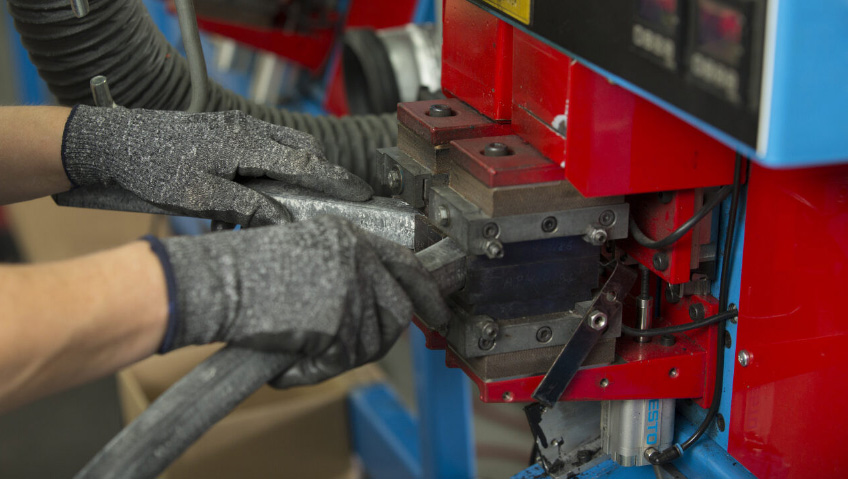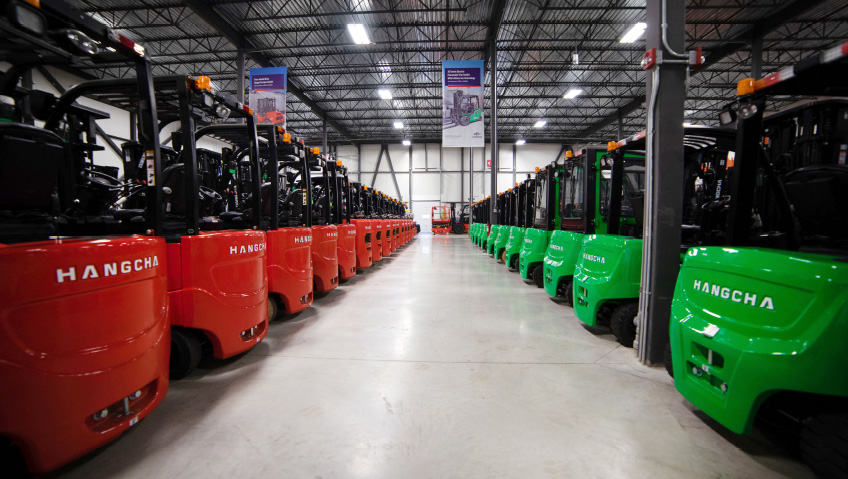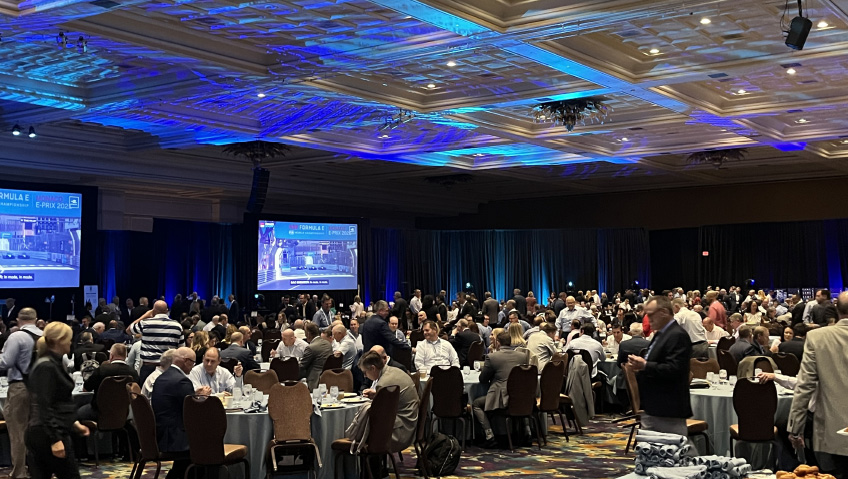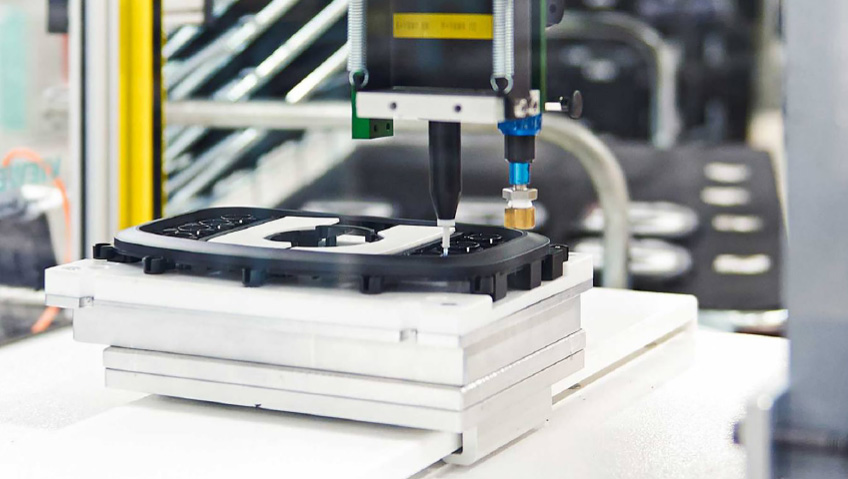Thriving, family-owned fabricator Elasto Proxy of Boisbriand, Quebec specializes in high-end, low-volume industrial plastic and rubber components. The company also offers a suite of value-added services and maintains close relationships with its clients.
“It’s not just about providing a rubber part or an insulation part; it’s also being a trusted advisor with our customer,” says Sales and Marketing Manager Roberto Naccarato.
Elasto Proxy’s custom fabrication skills include waterjet cutting, lamination, bonding, and taping. Lamination is the creation of “insulation sandwiches,” as the company puts it, consisting of layered rubber sheets. Bonding involves joining rubber profile ends to make finished gaskets, while pressure-sensitive adhesive or heat-activated taping temporarily or permanently fastens rubber products. Pure waterjet cutting is intended for rubber, plastic, foils, fabrics, and other softer, thinner, materials, and abrasive waterjet cutting is applied to tougher, thicker substances such as glass, metals, and composites. Warehousing, logistics, kitting, and sourcing are also offered by the company as value-added services.
Most production work is done in Boisbriand, although this might soon change. Elasto is preparing to expand light fabrication operations at a branch it maintains in Simpsonville, South Carolina. Once paperwork is finalized, this facility should be “up and running by 2024,” shares Naccarato.
The company also has a light fabrication plant in Ghent, Belgium and a distribution facility in Newmarket, Ontario. It remains committed to future growth and would love to expand west within North America.
Elasto serves the heavy equipment, defense, food equipment, building, medical and health, and transportation sectors. Transportation includes mass transit, semis, transport trucks, service vehicles, flatbed trucks, aviation, and aerospace. Heavy equipment—a broad category covering agricultural, mining, forestry, construction, emergency vehicles, and ground service vehicles—is the top revenue generator for the firm, followed by military.
The company’s products for the heavy equipment sector range from door seals and window gaskets to acoustic and thermal insulation, silicone hose connectors, bumpers, anti-vibration mounts, rubber grommets, and rubber hose clamps. Products for the defence sector include hatch seals, firewall protection for engine bays, and grip tape to prevent soldiers from slipping off the top of military vehicles.
Despite doing considerable business with the heavy equipment and military markets, the company maintains a diversified workload and avoids focusing too heavily on one sector. That way, if a downturn occurs within a particular market, it will not impact overall business too heavily.
Components are often custom-built “based on what the customer is looking for. We help with the design aspect of it,” says Naccarato. While plenty of other fabricators make similar parts, few offer the kind of comprehensive services and support of which Elasto Proxy is capable. “Most of our customers have a production-line type of business,” he says. “We try to ensure there’s no downtime on their production lines. This is where those value-added services come in, in terms of warehousing or kitting.”
Kitting refers to an inventory management system in which related parts or products are combined into a single unit. It is a way to enhance efficiency in manufacturing processes that use large numbers of separate pieces and components. The client benefits through faster assembly, reduced overhead, less packaging waste, volume discounts, and fewer errors. For example, Elasto can custom-fabricate and then package latch gaskets, rubber bumpers, mud flaps, door seals, and other service truck parts into a neatly organized kit.
Warehousing, of course, entails storing raw materials and production parts for customers. Clients use this service to stock up and guarantee continuity in case of unforeseen circumstances. Should a client experience water damage at their factory, for example, they can turn to Elasto for a safe and secure supply of parts. In North America, the company maintains warehouses in South Carolina, Newmarket, and Boisbriand.
Sourcing is another popular value-added service. Relying on its own huge raw material supply chain and decades of experience, Elasto Proxy is able to consolidate and simplify the vendor list of its clients. The company can provide one-stop sourcing while ensuring that raw materials for customers meet regulatory requirements and industry standards.
“I’ve seen customers with 20 suppliers in their commodity base. Most of them are single product suppliers. We’re able to consolidate that, so a buyer only has to manage one supplier, with multiple products,” Naccarato explains.
Assembly packaging and acoustic lab testing and metrology are other value-added services offered by Elasto.
The company was launched—under rather humble circumstances—by Doug and Donna Sharpe in 1989. At the time, many fabricators focused on high-volume production, a model that worked well for big automotive companies and the like but was not suitable for companies that required fewer components. Elasto Proxy was founded to fill this gap, with an emphasis on low-volume runs of first-class components.
The company name was created by blending the words ‘elastomer’ and proxy—giving someone authority to vote or speak on your behalf. The concept was that clients could rely on the Elasto team to look out for their interests.
Production work for the young firm was initially performed in the Sharpes’ basement, while the family garage served as a warehouse. The business became a success thanks to a combination of good products, hard work, and the Sharpes’ relationship-building skills. “They forged partnerships with the extruders,” says Naccarato of the company’s early days. “They were able to earn customers and build on that.” As the years went by, “we added suppliers and offered different types of products as well.”
Today, Doug and Donna Sharpe are transitioning out of the company, but this remains a family business. The Sharpes’ son Clyde has taken over as Chief Executive Officer while younger son Kevin works in the accounting department.
At present, 60 people are employed across all branches, up from 50 last year at this time. Interestingly, not only is this company 50 percent female-owned, a majority of its workforce are women, and all personnel are passionate about their jobs.
“The biggest thing that stands out—and it sounds cliché—is the people inside the company. Our passion is to build a community and culture that you can trust; that starts with our staff. Our customers love our service. We are quick to respond to them,” Naccarato states.
There is little turnover among existing staff. As for new hires, “We want someone who is curious. We’re engaged; we’re professional; we’re loyal, and we’re problem-solvers. You have to be curious to be a problem-solver,” he says. Employees also have to be prepared to take on different responsibilities if need be.
The company’s upwards momentum was briefly halted when COVID became a global scourge in March 2020. “We did take a hit; we lost almost 30 to 40 percent of our business that year. We’ve made that up [since and] more.”
Since it supplied products for the military and medical agencies, Elasto was deemed an essential business and production never ceased. To ensure the safety of its employees, health protocols including dividers, social distancing, and extra cleaning were introduced in the production plant while office staff worked from home.
This focus on workforce well-being is matched by an intense effort to ensure consistent quality. Elasto Proxy maintains ISO 9001:2015 certification and a comprehensive quality assurance program. The company has its own quality department, performs internal audits, and holds quarterly meetings to review quality issues and discuss any potential challenges.
“Every time a new part is developed, we have to make sure we understand the critical dimensions,” says Naccarato. “That gets recorded on an inspection form. We have someone that inspects products that go out. We have inspection forms for products that come in. All the raw material that comes in gets inspected.”
The company is keeping an eye out for potential new products and services and employs a research and development engineer whose job is to explore these areas. The firm is also considering ways to expand its presence in the burgeoning electric vehicle market. At the same time, it is enhancing its existing capabilities such as lamination and abrasive waterjet cutting. “We have a standard waterjet machine that can cut rubber and foam parts, but we also have abrasive waterjet capabilities [and can cut materials such as] brass, copper, ballistic metals, and composite materials,” says Naccarato, who adds, “we can cut up to four inch-thick titanium metal.”
Like most industrial/manufacturing businesses in North America, the biggest challenge at present is finding good, skilled workers. “Recently, we hired a digital content creator. One of the objectives we have is to be able to promote what it is to work for Elasto Proxy,” says Naccarato.
As for the future, expansion is definitely on the agenda. “My biggest message moving forward is, we’re a small company but we think big. We’re always looking to grow and continuously improve,” says Naccarato.






